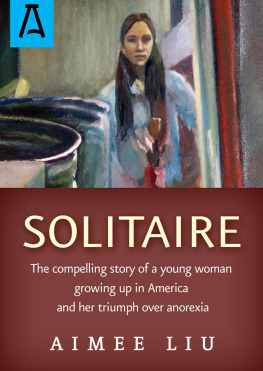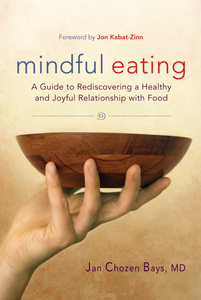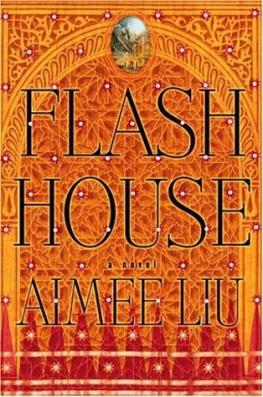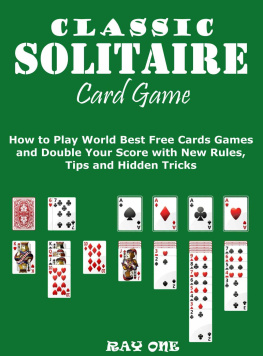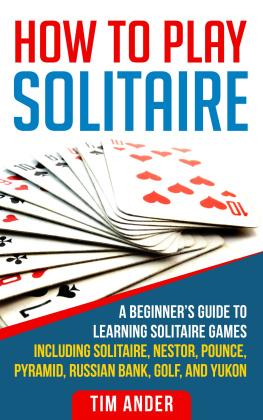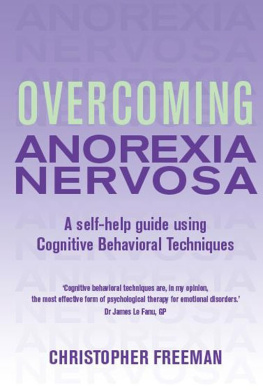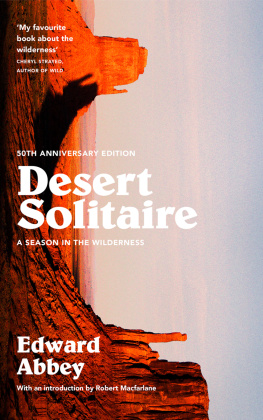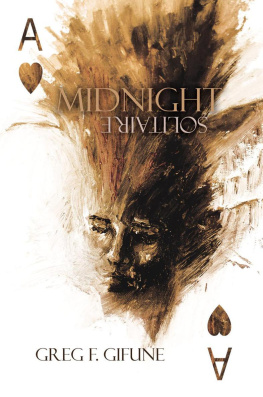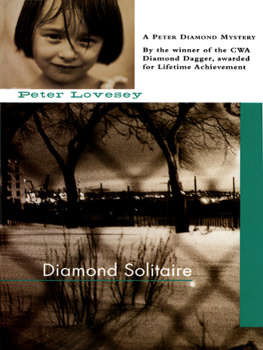Aimee Liu - Solitaire
Here you can read online Aimee Liu - Solitaire full text of the book (entire story) in english for free. Download pdf and epub, get meaning, cover and reviews about this ebook. year: 2016, publisher: Open Road Distribution, genre: Home and family. Description of the work, (preface) as well as reviews are available. Best literature library LitArk.com created for fans of good reading and offers a wide selection of genres:
Romance novel
Science fiction
Adventure
Detective
Science
History
Home and family
Prose
Art
Politics
Computer
Non-fiction
Religion
Business
Children
Humor
Choose a favorite category and find really read worthwhile books. Enjoy immersion in the world of imagination, feel the emotions of the characters or learn something new for yourself, make an fascinating discovery.
- Book:Solitaire
- Author:
- Publisher:Open Road Distribution
- Genre:
- Year:2016
- Rating:5 / 5
- Favourites:Add to favourites
- Your mark:
- 100
- 1
- 2
- 3
- 4
- 5
Solitaire: summary, description and annotation
We offer to read an annotation, description, summary or preface (depends on what the author of the book "Solitaire" wrote himself). If you haven't found the necessary information about the book — write in the comments, we will try to find it.
Aimee Liu: author's other books
Who wrote Solitaire? Find out the surname, the name of the author of the book and a list of all author's works by series.
Solitaire — read online for free the complete book (whole text) full work
Below is the text of the book, divided by pages. System saving the place of the last page read, allows you to conveniently read the book "Solitaire" online for free, without having to search again every time where you left off. Put a bookmark, and you can go to the page where you finished reading at any time.
Font size:
Interval:
Bookmark:

Solitaire
Aimee Liu
All rights reserved, including without limitation the right to reproduce this ebook or any portion thereof in any form or by any means, whether electronic or mechanical, now known or hereinafter invented, without the express written permission of the publisher.
Originally published by Harper & Row
Copyright 1979, 2000 by Aimee Liu
Designed by Eve Kirch
ISBN: 978-1-5040-3681-8
Distributed in 2016 by Open Road Distribution
180 Maiden Lane
New York, NY 10038
www.openroadmedia.com

When this memoir was first published I was twenty-five years old. That was the same year when compulsive binging and purging was first named bulimia nervosa. The term for compulsive self-starvation, anorexia nervosa, had a much longer history, but Id never heard the term during the adolescent years when I struggled with my eating disorder. Neither had my parents, friends, or doctors. Back then, there were no memoirs of anorexia or bulimia. And this was why, when I did first learn that these syndromes are diagnosable illnesses, I thought it could be helpful to others if I described my own subjective experience.
At the time, I didnt fully understand what had caused my obsession with weight and self-denial any more than I knew what specific changes or choices were responsible for my return to health during college. And there was no one back then who could have told me. But I recalled vividly the social, emotional, and physical consequences of my eating disorder. I was keenly aware of the distortions in my thinking and perception that had accompanied my compulsive exercise and food restrictions, and I knew the price Id paid academically and the toll it had taken on my family and relationships. I hoped that if my parents could read what had been going on in my teenage head we might have more compassion and understanding for each other going forward. And I hoped that if younger teens saw what the internal experience of an eating disorder is like, theyd be wary about placing too much importance on weight, dieting, and appearance. I wanted to encourage them to feel less pressure to look perfect, and more freedom to accept their true and natural selves. If they did, I believed, they would be less susceptible to eating disorders.
I still believe that. Unfortunately, our societys emphasis on appearance has intensified in the intervening decades, and the academic and emotional pressures on adolescents have only escalated. At the same time, scientific research has shown that eating disorders are much more complex conditions than I realized when I was writing about my own experience. Genes play a large role in determining who is vulnerable to anorexia and bulimia, and who is not. So do brain chemistry and biological temperamentpersonality. In fact, by 2007, there were so many new insights into the deeper nature of eating disorders that I wrote another book about what we know now that I didnt know when I wrote Solitaire.
That book, Gaining: The Truth About Life After Eating Disorders, revisits not only my own history but also those of the friends I wrote about in this 1979 memoir. It attempts to connect the dots between our early experiences of anorexia and bulimia and those of other men and women of all ages whove struggled with these disorders. And it explores the reasons why these illnesses now are understood and treated as biologically based mental illnesses. I wish my friends and I had had access to this understanding and treatment when we were young. Our recoveries would no doubt have been speedier and more complete if such treatment had been available. I say this because, in the course of writing Gaining, I met many gifted and compassionate specialists who are successfully curing eating disorders today. So I urge the readers of this edition to seek psychological help, preferably from an experienced eating disorder specialist, if you recognize yourself in the obsessions and compulsions described in these pages. If you need information or referrals, visit the Academy for Eating Disorders at www.aedweb.org.
The experience of writing Gaining also taught me a great deal about the vulnerability of certain individuals to images and ideas that can trigger eating disordered behavior. Specific calorie counts and comparisons of body weight are common triggers. And so Ive removed all such non-essential numbers from this edition of Solitaire. Because the story would make no sense without description of the actual behaviors involved in an eating disorder, Ive kept some episodes of binging, purging, and fasting, but these are not the focal point of the book.
My original focus in these pages was the existential struggle, which I still believe is core to eating disorders. Eating is such a primal behavior and food such a primal need that when our brains choose not to eat normally and naturally, this signals a primal problem. For me and virtually every other person Ive ever met whos suffered from an eating disorder, that problem involves identity. Who am I in the world? Why dont I know who I am? Why am I forced to be someone different than who I am? Why do I feel so wrong? Why cant others see that I feel empty inside? These are the kinds of questions that my eating disorder signaled, and that I wanted to bring out into the open when I first wrote this memoir. Learning how to answer them and how to embrace the truth that was contained within them proved to be an essential part of my own recovery. If my story can shed some light on yours or offer inspiration, I am grateful.
Aimee Liu
July 2013
Los Angeles
THE CHILD I was babysitting lay asleep upstairs. His parents werent due home for another three hours, ample time for temptation to seize me. The lure of the television, the call of my homework were no competition for the magnet of the kitchen: food. Like a creature obsessed, neither tasting nor thinking, I burrowed through cupboards, refrigerator, cookie jar, and freezer. Grabbing fistfuls of Mallomars and brownies, gulping ice cream, Jell-O, and cheese, I was indiscriminate in my gorging. Frenzied, as though possessed by some malevolent phantom, I raced through the larder and could quit only after collapsing in glutted agony. Then, when the spell finally broke, I loathed myself for such weakness and raged at my failure of willpower.
Staggering to the bathroom, I presented myself for penitence. The mirror cast its wrath upon me. My reflection resembled that of a bloat-bellied malnutrition victim. My scrawny arms, bony chest, and spindly legs cried out in protest against the distended abdomen of my cruel binge. The sight nauseated me. No doubt about it, eating was evil. My faith in the virtue of abstinence grew the longer I stood examining myself. It sent me into spasms of remorse over my greed and propelled me into a program of redemption.
I began by vomiting. Like yoga, my method relied on muscle contraction and concentrated control. But unable to purge myself completely this way, I worked out a backup maneuver. My magic cure was Ex-Lax. It was like swallowing Drano. The only problem was that the effects were not instantaneous, and I was desperate for immediate relief. I could feel the calories turning to fat as I waited. My last resort was exercise. Like an expectant mother, I bent over my swollen stomach to touch toes, gasped through hundreds of jumping jacks, and struggled through feverish sit-ups. Not even the impending homecoming of my employers could subdue me. Keeping an ear cocked for the sound of the garage door opening, I kept working out for as long as possible. I was haunted by the thought that a single carbohydrate might escape my frenzy and become flesh.
Font size:
Interval:
Bookmark:
Similar books «Solitaire»
Look at similar books to Solitaire. We have selected literature similar in name and meaning in the hope of providing readers with more options to find new, interesting, not yet read works.
Discussion, reviews of the book Solitaire and just readers' own opinions. Leave your comments, write what you think about the work, its meaning or the main characters. Specify what exactly you liked and what you didn't like, and why you think so.

